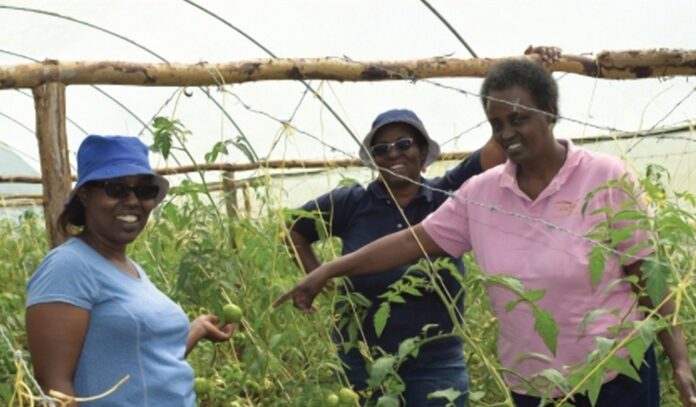Farming in Kajiado: My name is Mercy Mbijiwe. I farm together with my sisters Caroline and Roseleen. Our journey in farming started with research. We wanted to find out if farming was as profitable as it is made out to be. Upon our initial research, we realized that profitable farming was going to be a capital intensive venture. We began the process by forming a company that we could use as an investment vehicle. The company is called Elite Choice Limited. Today, our farming enterprise is one arm of this company.
We then determined our individual monthly contribution in order to raise our targeted initial capital of Sh. 750,000. After raising the initial capital, we began our project in August 2019 on our family farm that is approximately 4.5 acres, in Olooltepes, Kiserian in Kajiado County. The availability of the family land which was underutilized also informed our decision to go into farming. We began our farming by putting up an 80 x 30 metres greenhouses and planted tomatoes with the help of an agronomist, who took us through the initial steps of planting the tomatoes in trays and transplanting them to the greenhouse.
How we started with Sh. 200,000 and made Sh. 12 million in two years
Despite running our farming venture, we are still active in our different professions. Mercy is an Advocate of the High Court, Caroline is Human Resource Practitioner, and Roseleen is a HR and Business Process Manager. Farming, just like any other business, has its start-up challenges. The first challenge was to secure a reliable source of water. After speaking to different borehole owners, we were finally able to find one willing to connect us to their system. In the long-term we would like to drill our own borehole. However, the cost implication is a challenge that we hope to overcome, either through bank financing or engaging in collaborative engagements with other companies or individuals.
Other challenges entail human resourcing as well as identifying reliable service providers. Most of the casual workers do not exhibit the requisite diligence needed for the care needed in ensuring that the assigned work, including planting, fully meets the professional advice given to optimize the farm’s output. Most service providers are unreliable. These are major sources of frustration.
What I learned after taking Sh. 300,000 loan to start chicken farming
We are currently growing tomatoes in our greenhouse and have also extended the drip irrigation system to two open acres of land on which we are growing onion, garlic and chillies. So far, we have harvested 4,000 kilograms of the crop. We will be harvesting another round next month. Marketing of tomatoes is quite challenging, especially when there is glut in the market. When we started harvesting, we got a buyer who wanted to take the whole harvest at Sh. 40 per kilo. This was too low. We rejected him and started marketing the crop through pop up markets and online markets. In my estate, I would sell a kilo at as high as Sh. 100 during the Covid-19 lock down. We also got one buyer who took much of the produce at Sh. 60 per kilo. Apart from farming tomatoes, we rear goats on the farm. All our earnings are reinvested into the farm, in an effort to ensure all the systems and structures are fully developed for full farm operations before we begin to distribute dividends. All this is in consideration of the long term nature of the project with the initial decisions critical to success.
Our tips for women who want to venture into farming:
- Research widely and come up with a farming business plan. A plan that addresses all key areas such as water source, and agronomist support options. You should consider all aspects of a business plan which can attract financiers and investors.
- As part of the business plan, identify your target markets especially for perishable products. With a focus, a company is better able to channel its marketing budgets to specific markets. Where you can, value addition (such as processing tomatoes for tomato sauce) will enhance profitability.
- Be patient. Farming will not create instant wealth. It is a long-term plan that requires time and effort.
- Don’t do long distance farming. Be present during all the processes, infrastructure setup, planting, harvesting. Because we are a family, we support each other and share the burden of attending to activities on the farm. We have also involved our children and they are part of the process.
Farming in Kajiado: This feature was first published in the Saturday Magazine. The Saturday Magazine is a publication of the Nation Media Group.









